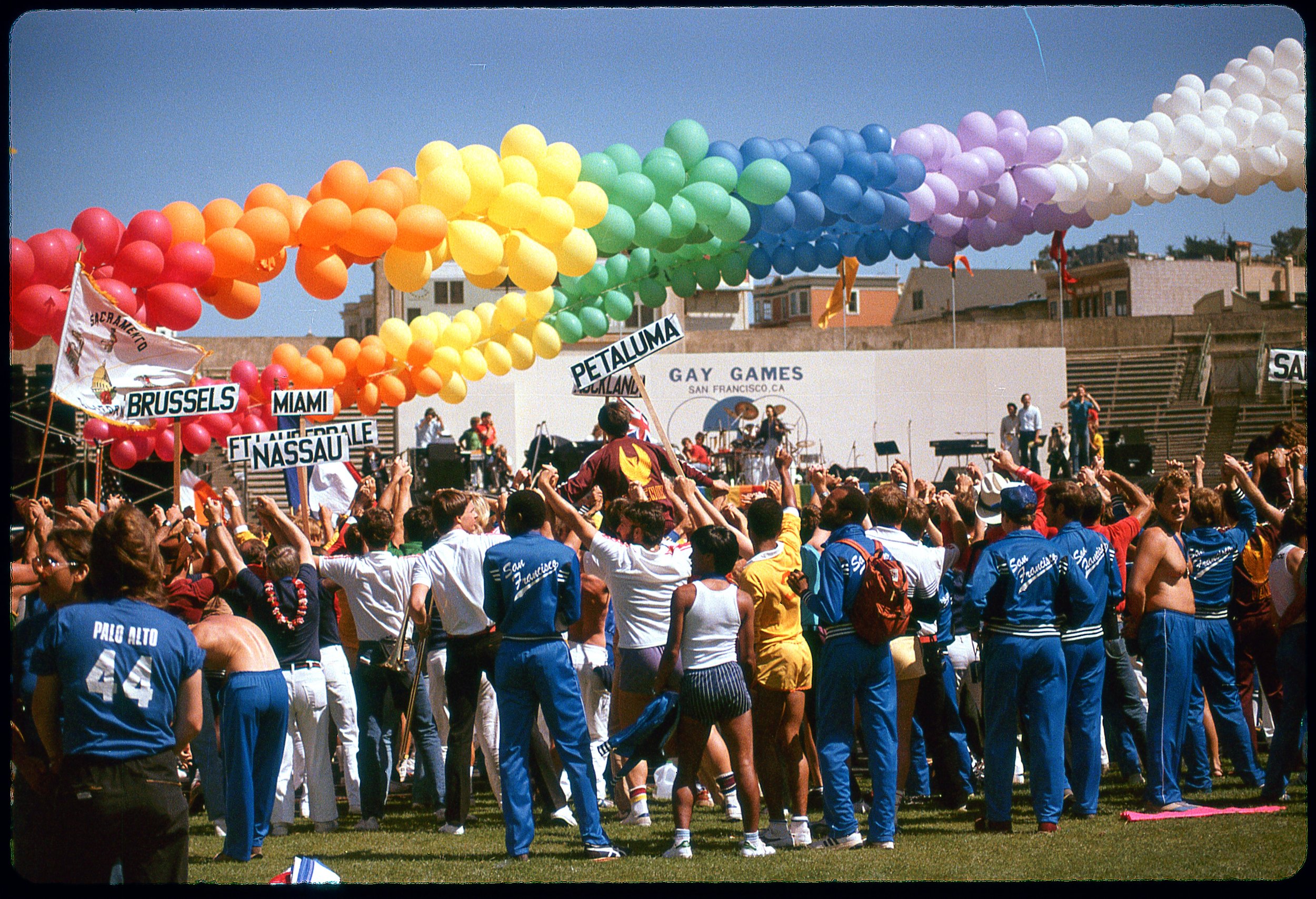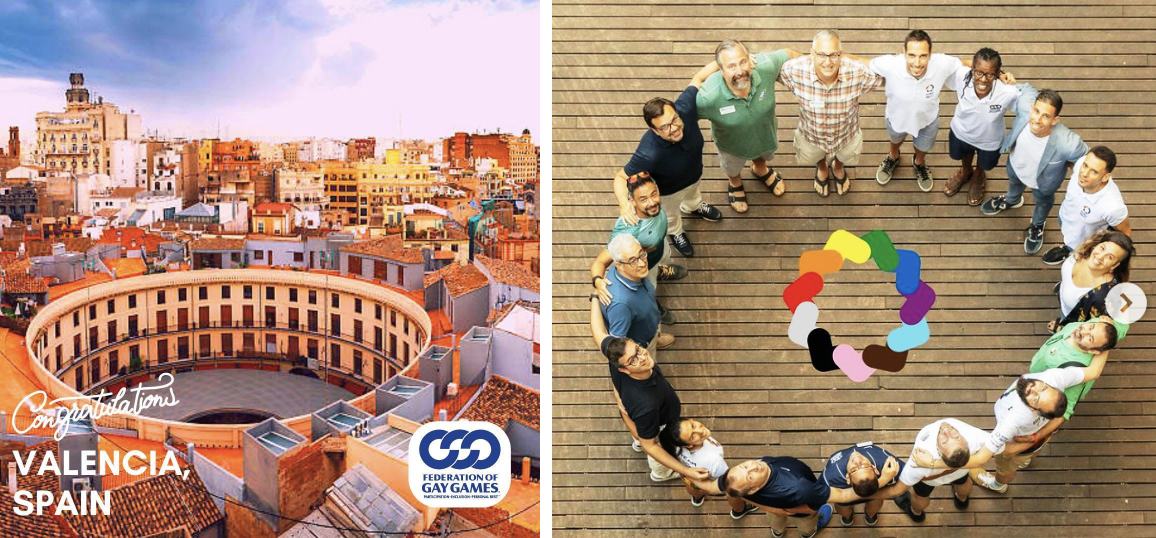
Passing the Torch
27.
Visions for the Future & Gay Games XII: Valencia 2026
KATE ROWE: The world has changed in the last 40 years. LGBTQ+ spirt has changed. There are far more opportunities for LGBTQ+ spirt and culture. My belief is that Tom Waddell’s vision and model was the way forward. But now in 2022, we need to change the model to fit the new world.
We still don't have enough young people, people with disabilities or other diverse constituencies. We have not made progress on equal participation of women, yet in mainstream sport, great inroads are being made. We can learn from them all.
I have been a passionate believer in Tom Waddell’s vision and played my part. It is up to us all and the board now and in the future, to rise to the challenge of change.
IVAN YAP: Since Hong Kong won the bid in 2017 to host Gay Games 11, it has lifted up the dynamic in Asia. FGG Asian membership has grown from one member organization to seven. The Straits Games has also transformed from a social sporting event group into an internationally legalised organisation when it has jointly formed and registered with the Taiwanese government together with two other organisations from Taiwan and Japan.
This regional organisation is now carrying the name Asia Pride Games Alliance with the headquarter residing in Taipei, Taiwan. The first Asia Pride Games was also held in Taipei with fullest support from the Taiwanese government. The 2nd edition of the Games is going to be carried out in Phnom Penh, Cambodia in 2023.
EMY RITT: Over time, the current FGG Site Selection process, led by David Killian, has matured into a more formal and serious business negotiation. Are there still potential issues and pitfalls to avoid? Of course, but the Site Selection process has been improved as the FGG organization has matured, and the last 2+ years of COVID and other challenges have been a reminder that there will always be unexpected issues requiring creativity and flexibility in order to continue the Gay Games legacy.
SHIV PAUL: In my capacity during my time on the FGG Board as Vice President of External Relations, I endeavoured to be the voice of FGG in the external world, protecting the brand and using it to shine a light on the LGBTQ+ communities’ struggles and its successes. When I am asked why it is necessary to have a Gay Games, I always reply that the fact it is still here 40 years later, in part, answers this question. The Games has always fought to enable participation, inclusion, and (the delivery of your) personal best in sport and culture, and also in life. My dream for the future of the Games is for it to be a truly visible, prominent, and loud representative voice for the LGBTQ+ communities at the most important tables in the world. The most important fight of all is for everyone to feel embraced by the loving arms of inclusion and belonging whenever and wherever they choose to present their true selves. But for as long as there are spaces and moments where those are lacking, the arms of the Games will always be there.
TONY SMITH: Another element of the future continues to be the very essence and importance of the Gay Games and its mission. With the world experiencing more and more tolerance and equality, the future of the Gay Games was questioned many times. The Gay Games mission is to promote equality through sport and culture, and this will continue until the entire world experiences true equality. This equality includes the evolution from the history of focusing on Lesbians and Gays to our bisexual, trans and queer members of our family. The 2026 bids for Guadalajara, Munich, and Valencia reflected today’s world in these regards and their commitment to address these newer challenges for our LGBTQ+ community. The bids from these cities also emphasized further evolution of sports to include modern events such as Quidditch from Harry Potter and E-sports.
While the visibility and equality of the LGBTQ+ community continues to grow, we also continue to have setbacks. It is paramount for the future of the Federation of Gay Games to have the pulse of the entire world and continue working to promote equality through sports and culture for unforeseeable years in the future.
LAURA MOORE: I have, in the past, thought that the Gay Games might become obsolete. I imagined a time when LGBTQ+ people would be integrated into all areas of society. Working on the Gay Games Scholarship Committee, I realize how incredibly privileged most Gay Games participants are. The Gay Games remain a necessary and life affirming resource. Today, living in a country that is sliding swiftly backwards, I realize that I will continue to fight the same battles I have been fighting for the rest of my life.
I hope the Gay Games survive. It is increasingly difficult for hosts to be able to accommodate an ever-increasing list of events. As equitable as we want to be, we lack the volunteer power necessary to include winter sports that need to be outdoors. For many years, the volunteer FGG Board of Directors and sports and culture leaders were getting older. Today we have a wonderful team of younger dedicated volunteers bringing their views and experiences to the FGG and Gay Games.
One of the most challenging issues for us is the name “Gay Games.” I agree with the traditionalists among us that we should honor Tom Waddell and his vision. On the other hand, I recognize that there are now many queer people who don’t see the word “Gay” as applying to them. I am proud to serve on the FGG Equity, Diversity, and Inclusion Committee where I have had the opportunity to have my own biases and assumptions challenged. I believe that we need to be relevant in ways that will grab the attention of the younger people who are the future of our movement.
MARK BROWN: Other than having the Gay Games come back home to San Francisco, I would love to see them take place in Las Vegas. There’s already an annual gay sports festival with thousands of athletes, so they have plenty of experience running things, including many of the Gay Games events. And they’re used to hosting big events there, so the travel costs for attendees would be reasonable.
JEAN-NICKOLAUS TRETTER: We need to have something like the Gay Games and other similar institutions. That is so future generations can learn that they are not just a sexual anomaly; they are a very important people with a history, with a culture, and with outstanding abilities. No matter how good you are, or not, by participating in the Gay Games you become someone and have an identity about yourself and others around you. It builds self-confidence and self-worth within ourselves and our communities. Besides, those Gay Games medals hanging on your walls look pretty impressive when people come over.
GAY GAMES XII: VALENCIA 2026
The Gay Games will be coming to Valencia Spain in 2026! They were chosen at the 2021 Annual General Assembly in Brighton UK.
To read the press release about this news HERE.
A video of the final phase of the multi-year Site Selection process at which Valencia was announced as the host for Gay Games XII in 2026
The FGG wants to thank the bidding teams from Guadalajara and Munich, who were both finalists for Gay Games XII.



